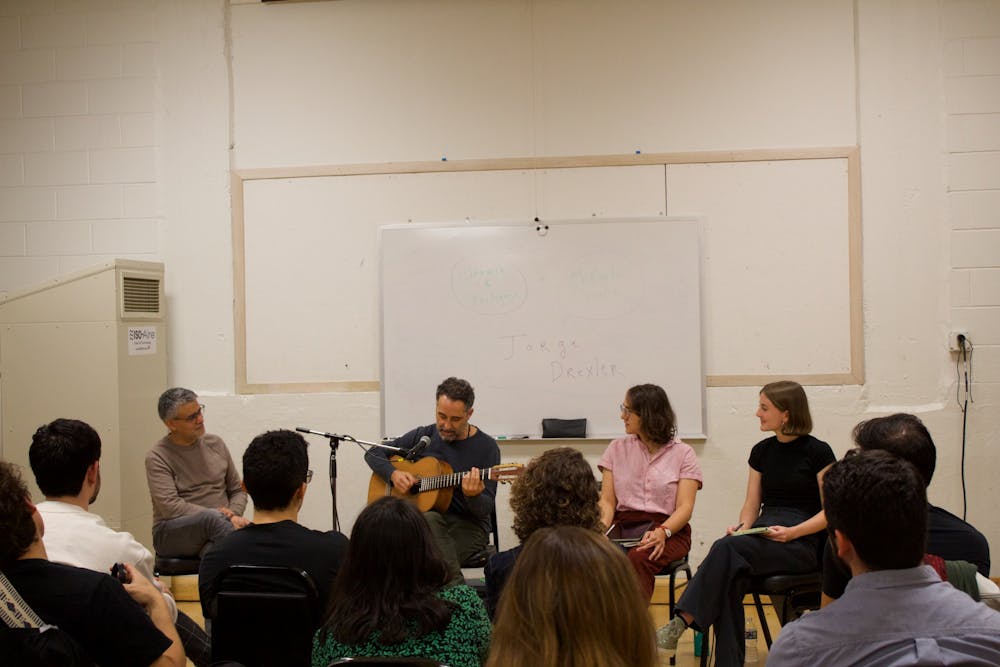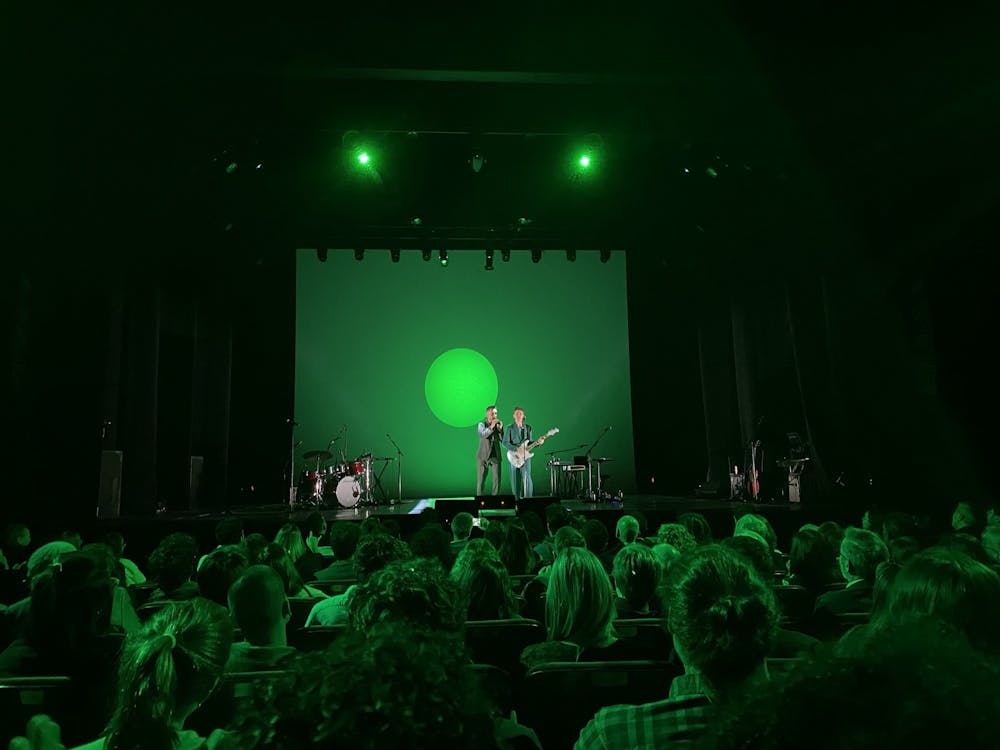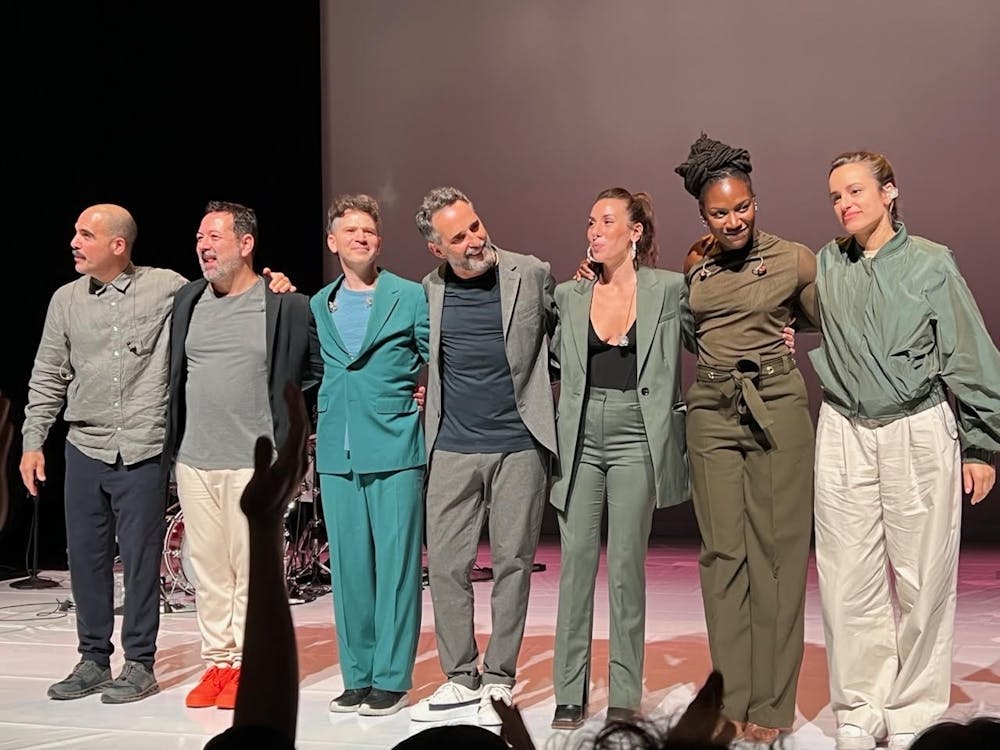Sometime in August, one of my favorite singers and thinkers of all time, Jorge Drexler, announced the addition of a new date to his 2022 “Tinta y Tiempo” world tour. My heart skipped a beat when I read “Show Added: McCarter Theatre, Princeton, N.J.” How in the world was this Grammy and Oscar-winning, Latin-American superstar coming to this small college town in the middle of New Jersey?
After rushing for front-row tickets, my good friend Jordan Salama ’19 put me in contact with McCarter Theatre administrator Debbie Bisno. I found myself invited to a pre-show workshop with Drexler in collaboration with the University’s Department of Spanish and Portuguese, and to dinner with Drexler and his band the night before the show. The night that also happened to be my birthday. My parents, brothers, and friends back home in Buenos Aires were all in disbelief. And so was I.
When the long-awaited day — Wednesday, Nov. 9 — finally arrived, I still couldn’t believe I would be dining with the artist who shaped my musical taste and whose ideas helped me recognize my own identity as multidimensional. Like myself, Jorge Drexler is a J-Lat: a Jewish Latino. His vision of identity as a spectrum allowed me to understand the extent to which I belong to all my intersecting identities: a little to them all, but to none of them entirely. It is in these shades of gray that identity can be so wonderful.
When Drexler arrived to dinner at La Mezzaluna, I pretended to keep my cool, though in truth, I could hardly contain myself. Dinner table topics ranged from Puerto Rico’s reggaeton beast Bad Bunny to modern Brazilian literature, and I also made friends with Drexler’s backup singers Alana Sinkey and Miryam Latrece. After a while, in trying to guess my zodiac sign, they both asked when my birthday was, and I modestly responded “November 9th.” They spread the news around the table and in a matter of seconds, the Italian restaurant owners came with a candle and the entire crew was singing happy birthday to me. I don’t think I will ever recover from having Drexler across the dinner table sing me the happy birthday song.

Courtesy of Debbie Bisno
After that once-in-a-lifetime dinner, the next day’s pre-show workshop was filled with important lessons about identity, music-making, and connecting through contradiction. The event was an interactive Q&A session with some guitar and live songs, too. But Drexler said he felt nervous, as he wasn't familiar with that event format.
By the end, a graduate student asked him if he ever contradicted his younger self's songs in his new music’s lyrics. He proudly assented and followed by saying that contradicting oneself is not only inevitable, but it’s also pivotal to one’s growth. He said contradiction gave foundation to his evolution as a composer because he became loyal to his own growth and changing of minds. His insightful answer made me question what I believe today; maybe I will be contradicting myself about 10, 20, or 50 years down the road.

Ian Fridman / The Daily Princetonian
When the event finished, I approached him to ask him a lingering question. “How has growing up mixing Jewish and Christian traditions shaped your perception of identity as non-binarily defined?” He responded that his parents feared he would be seen as belonging to the “other” side, so, going against Jewish tradition, they named Jorge Abner Drexler after both of his living grandparents.
“I was the bridge between families, between traditions,” he said. In his own metaphor, by growing up in the middle of two worlds, he gained two one-dimensional lenses, making a binocular that allowed him to see in three dimensions.
The time came for the big moment: the “Tinta y Tiempo” concert in McCarter. The lights dimmed, the crowd cheered in anticipation. I remember just how special that instant was. The show kicked off with the epic, existential vertigo song “El Plan Maestro” (the master plan), before giving way to a mixed journey of heartfelt acoustic ballads and upbeat danceable hits, of new bops and timeless hits.
After a song or two, Drexler asked the room who didn’t speak Spanish. About 20 people raised their hands. The rest of us were assigned a task: to be the “hosts” of the non-Spanish speakers for the night, to explain to them the songs’ meanings, and to extend our arms to them. For the rest of the concert, there was a linguistic and cultural exchange in the air; it felt like a big web of Latinos and Spanish speakers welcoming, or in Drexler’s words, hosting our neighbors. We opened the doors to Latinx culture, art, and rhythm.


Ian Fridman / The Daily Princetonian
By mixing sounds from across Latin-America — from Brazilian funk to Argentinian Samba — Drexler truly brought a piece of home to McCarter’s stage. The synergy between him and the audience was electric, as he orchestrated our claps, kicks, and singalongs. During “Movimiento” (movement), the stage turned into a savanna, with animal noises and a high-energy performance that included dancing and rapping about human history and evolution. For more melancholic songs like “Inoportuna” (untimely), the set turned blue to lyrics about the unpredictability of times.
Before singing “Cinturón Blanco” (white belt), Drexler explained the meaning behind it. “It’s about feeling like a beginner again,” as he reflected on how much he appreciates feeling new to things, looking at the world with beginner’s eyes, and starting from scratch. He followed by saying that’s exactly how he’d felt that morning at the Department of Spanish and Portuguese workshop when he stepped out of his comfort zone by going into an open conversation Q&A, but turned that into a learning experience for himself as well.
The concert ended with crowds headed to the front of the stage to jump, dance, and sing along to his greatest hit, “Todo Se Transforma” (everything is transformed).
Jorge Drexler’s visit to campus was transformative. Through the dinner, workshop, and concert, how much of a 360-degree artist he is (musician, philosopher, writer, guitarist, intellectual, etc.) brilliantly shone through. Drexler said of his experience in Princeton
“The day we spent at McCarter Theatre was much more than a regular concert,“ Drexler said of his experience in Princeton. “The eagerness for knowledge and the warmth with which the Princeton students and professors received me in the [“Behind the Scenes”] talk we shared in the morning, set the tone for what happened in the concert at night.”
“We all agreed that it was one of the most beautiful shows of the tour from a musical and technical point of view. And the warmth of the public took us completely by surprise!” he continued. “We felt at home. Thank you, McCarter and Princeton! We are looking forward to coming back soon!”
After Drexler’s visit, I’m left excited to be a ‘host’ and spread Latinx culture on campus more, to contradict myself regularly in the process of evolving, and to challenge myself to be a beginner, to wear that cinturón blanco more often.
Ian Fridman is a photo staffer from Buenos Aires, Argentina. He can be reached at ianfridman@princeton.edu.
Self essays at The Prospect give our writers and guest contributors the opportunity to share their perspectives. This essay reflects the views and lived experiences of the author. If you would like to submit a Self essay, contact us at prospect@dailyprincetonian.com.








